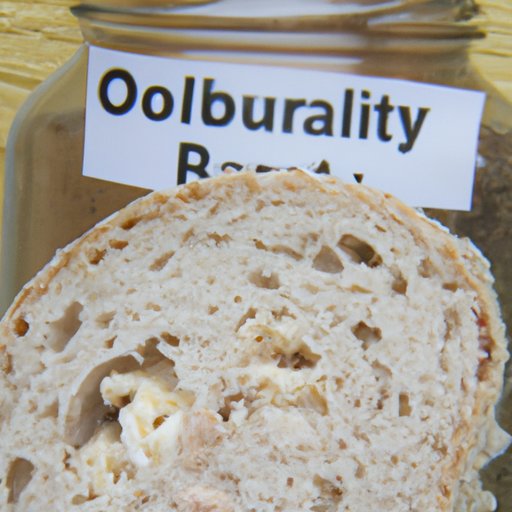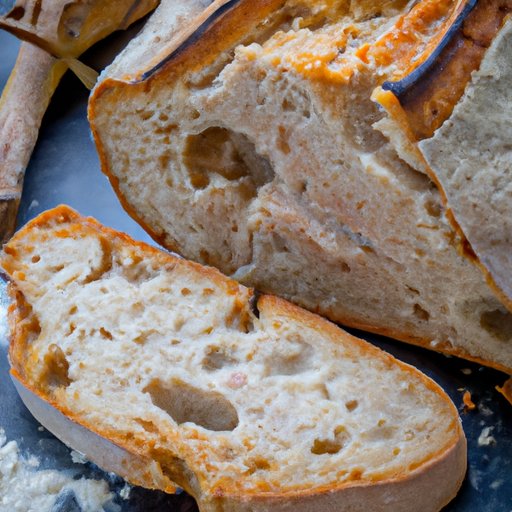Introduction
Sourdough bread is made from a combination of flour, water and wild yeast. It has been around for centuries, dating back to the ancient Egyptians and Greeks. Sourdough bread is known for its unique flavor and texture, as well as its health benefits. In this article, we will explore why sourdough bread is healthier than other types of bread and what makes it so beneficial for our health.

Nutritional Benefits of Sourdough Bread
When comparing the nutritional content of sourdough bread to other types of bread, you can see that it is higher in minerals, vitamins and fiber. This is because the fermentation process used to make sourdough bread breaks down the starches and proteins in the flour, making them easier for the body to digest and absorb. The fermentation process also increases the levels of B vitamins, which are important for energy metabolism and cell growth.
The fermentation process also helps to reduce the gluten content of the bread, making it easier for those with gluten sensitivities to enjoy. Additionally, sourdough bread is lower in sugar than other types of bread, which is beneficial for those watching their sugar intake.
Low Glycemic Index
The glycemic index (GI) measures how quickly carbohydrates affect your blood sugar levels. Foods with a high GI cause a rapid increase in blood sugar, while those with a low GI cause a slower and more gradual rise. Sourdough bread has a lower GI than other types of bread, meaning it won’t cause your blood sugar to spike as quickly.
This is beneficial for those with diabetes or pre-diabetes, as it helps regulate blood sugar levels and prevent spikes. Additionally, it can help keep hunger at bay, as it releases glucose into the bloodstream slowly over time.
Easier to Digest Than Other Types of Bread
Sourdough bread is easier to digest than other types of bread due to the fermentation process. The fermentation process helps to break down the proteins and starches in the flour, making them easier to digest. Additionally, the lactic acid produced during the fermentation process helps to reduce the phytic acid content of the bread, which can interfere with the absorption of essential minerals such as calcium, iron and zinc.
This makes it easier for your body to absorb and utilize the nutrients found in sourdough bread, making it a more nutritious option than other types of bread.

Beneficial Probiotics and Enzymes in Sourdough
The fermentation process used to make sourdough bread also produces beneficial probiotics and enzymes. Probiotics are beneficial bacteria that can help improve digestive health and boost the immune system. The enzymes present in sourdough bread help to break down the starches, making them easier for the body to digest and absorb.
These beneficial bacteria and enzymes can help improve gut health and reduce inflammation in the body, which can lead to better overall health.

Reduction of Inflammation in the Body
Research has shown that eating sourdough bread can help reduce inflammation in the body. Inflammation is linked to a number of chronic diseases, such as heart disease, type 2 diabetes and certain cancers. Eating sourdough bread can help reduce inflammation in the body, which can help reduce the risk of these diseases.
Additionally, the beneficial bacteria and enzymes found in sourdough bread can improve gut health, which can also help reduce inflammation in the body.
Conclusion
Sourdough bread is a healthier choice than other types of bread due to its nutritional benefits, low glycemic index, easier digestion and beneficial probiotics and enzymes. Eating sourdough bread can help regulate blood sugar levels, improve digestive health, reduce inflammation in the body and provide essential nutrients and minerals. So, if you’re looking for a healthier bread option, look no further than sourdough bread.
(Note: Is this article not meeting your expectations? Do you have knowledge or insights to share? Unlock new opportunities and expand your reach by joining our authors team. Click Registration to join us and share your expertise with our readers.)
